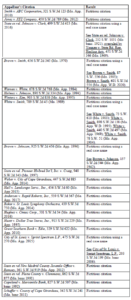$10,000 in Sanctions for Using AI

What is the penalty for a pro se party retaining a “consultant” who used “artificial intelligence hallucinations” to prepare an appellate brief with fictitious case law? A Missouri Court of Appeals recently had the opportunity to answer that question.
In Molly Kruse v. Jonathan R. Karlen, et al., Kruse sued her former employer for unpaid wages. Kruse alleged she was chief creative officer for her employer from 2015 to 2019, but that the employer failed to pay her wages for 2018 and 2019. Karlen, appellant, was the owner and chief executive officer of her former employer.
The trial court granted summary judgment against Karlen, awarding Kruse $72,936.42 in unpaid wages, $145,872.84 in damages, and $91,908 in attorney’s fees. Prior to the summary judgment hearing, Karlen was represented by counsel; during and after the proceeding, including on appeal, he represented himself, pro se.
Karlen’s briefing to the Court of Appeals contained numerous “deficiencies”, including the submission of fictitious cases which were generated by artificial intelligence. Out of the 24 case citations contained in his Appellate Brief, only two were real. The chart presented by the Court illustrates the extent of the problem.
In addition, Karlen’s brief cited statutory and rule authorities that did not state what he claimed they did.
In his Reply Brief to the Court, Karlen apologized for submitting fictitious cases and explained that he hired an online “consultant” who represented to be a licensed attorney in California to prepare the initial Appellant’s Brief, without knowledge that the attorney would use “artificial intelligence hallucinations”. The consultant’s fee was less than 1% of what Karlen alleged it would cost to retain an attorney to prepare the Brief.
Although Karlen denied any intent to mislead the Court or waste Kruse’s time in researching the fictitious precedent, the Court found that Karlen’s “apology notwithstanding, the deed had been done, and this Court must wrestle with the results.” The Court held that filing an appellate brief with “bogus citations” represents a “flagrant violation” of the duties of candor owed to the Court, dismissing Karlen’s appeal and ordering him to pay Kruse’s attorney’s fees for the appeal, in the amount of $10,000.00, as a sanction.
Several courts, notably one of the Judges for the United Stated District Court of the Northern District of Texas, have taken action to curb the use of artificial intelligence in preparing briefs submitted to them. The Northern District Judge requires attorneys sign a verification that states as follows.
I certify that no portion of any filing in this case will be drafted by generative artificial intelligence or that any language drafted by generative artificial intelligence—including quotations, citations, paraphrased assertions, and legal analysis—will be checked for accuracy, using print reporters or traditional legal databases, by a human being before it is submitted to the Court. I understand that any attorney who signs any filing in this case will be held responsible for the contents thereof according to applicable rules of attorney discipline, regardless of whether generative artificial intelligence drafted any portion of that filing.
We are only at the very early stages of our journey with AI, and it is already proving to be a strange and interesting one. If you have any questions about the use of AI in your workplace, please contact one of the human being attorneys in either our Austin or Dallas office. We may be reached at info@gstexlaw.com.
Legal Disclaimers
This blog is made available by Gerstle Snelson, LLP for educational purposes and to provide general information about the law, only. Neither this document nor the information contained in it is intended to constitute legal advice on any specific matter or of a general nature. Use of the blog does not create an attorney-client relationship with Gerstle Snelson, LLP where one does not already exist with the firm. This blog should not be used a substitute for competent legal advice from a licensed attorney.
©Gerstle Snelson, LLP 2024. All rights reserved. Any unauthorized reprint or use of this material is prohibited. No part of this blog may be reproduced or transmitted in any form or by any means, electronic or mechanical, including photocopying, recording, or by any information storage or retrieval system without the express written permission of Gerstle Snelson, LLP.


